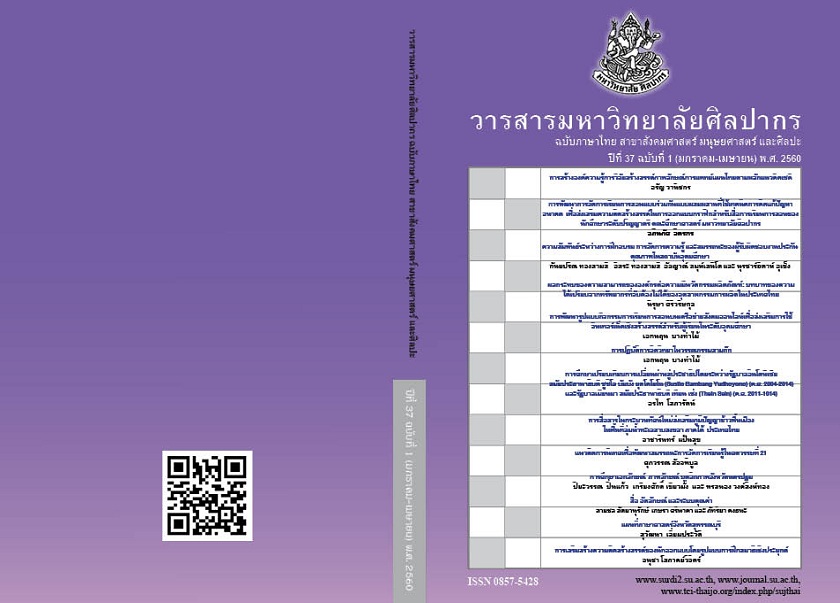การพัฒนารูปแบบกิจกรรมการเรียนการสอนบนเครือข่ายสังคมออนไลน์เพื่อส่งเสริมการใช้อินเทอร์เน็ตเชิงสร้างสรรค์สำหรับผู้เรียนในระดับอุดมศึกษา (The Development of Learning and Teaching Activities through Online Social Networking to Promote Creative Internet Using for Students in Tertiary Level )
Main Article Content
Abstract
การวิจัยครั้งนี้มีวัตถุประสงค์เพื่อ มีวัตถุประสงค์ (1) เพื่อพัฒนารูปแบบกิจกรรมการเรียนการสอนผ่านระบบเครือข่ายสังคมออนไลน์ (2) เพื่อศึกษาการทดลองใช้รูปแบบกิจกรรมการเรียนการสอนผ่านระบบเครือข่ายสังคมออนไลน์ กลุ่มตัวอย่างที่ใช้ในการวิจัยครั้งนี้ได้แก่ นักศึกษาระดับปริญญาตรี คณะศึกษาศาสตร์ มหาวิทยาลัยศิลปากร ที่ลงทะเบียนในรายวิชานวัตกรรมเทคโนโลยีสารสนเทศและการสื่อสารทางการศึกษา จำนวน 30 คน โดยใช้การสุ่มแบบกลุ่ม (Cluster Sampling) โดยมีการเก็บรวบรวมทั้งเชิงปริมาณและคุณภาพ ผลการศึกษาพบว่า 1. รูปแบบกิจกรรมการเรียนการสอนบนเครือข่ายสังคมออนไลน์เพื่อส่งเสริมการใช้อินเทอร์เน็ตเชิงสร้างสรรค์ สำหรับนักศึกษาระดับอุดมศึกษาที่ผู้วิจัยพัฒนาขึ้นมีขั้นตอนดังนี้ (1) วางแผนการเรียนรู้และปฐมนิเทศการเรียน (2) การสร้างแรงจูงใจในการใช้อินเทอร์เน็ตเชิงสร้างสรรค์ (3) สนับสนุนให้ผู้เรียนกำหนดเป้าหมายทางการเรียนและประเมินตนเอง (4) นำเสนอแนวทางของตนเอง (5) การนำเสนอกิจกรรมที่ส่งเสริมการใช้อินเทอร์เน็ตเชิงสร้างสรรค์ (6) สนับสนุนการสืบเสาะหาความรู้ (7) นำเสนอผลงานจากสถานการณ์ตัวอย่างที่กำหนดขึ้น (8) การประเมินผลในลักษณะสังคมมิติ (9) สรุปคุณลักษณะการใช้อินเทอร์เน็ตเชิงสร้างสรรค์ โดยมีค่าเฉลี่ยในการประเมินรูปแบบในภาพรวมเท่ากับ 4.96 ส่วนเบี่ยงเบนมาตรฐานเท่ากับ 0.07 และ 2. ผลการทดลองใช้รูปแบบ พบว่า (2.1) ผู้เรียนมีพฤติกรรมการใช้อินเทอร์เน็ตเชิงสร้างสรรค์ในแต่ละด้านอยู่ในระดับมาก โดยมีค่าเฉลี่ยรวมเท่ากับ 3.00 ส่วนเบี่ยงเบนมาตรฐานเท่ากับ 0.60 (2.2) พฤติกรรมการใช้อินเทอร์เน็ตสร้างสรรค์จากการทดสอบก่อนเรียนหลังเรียนพบว่า จากการเรียนด้วยรูปแบบหลังเรียนสูงกว่าก่อนเรียนอย่างมีนัยสำคัญทางสถิติที่ระดับ .01 (2.3) ความคิดเห็นของผู้เรียนจากการเรียนด้วยกิจกรรมการเรียนการสอนบนเครือข่ายสังคมออนไลน์เพื่อส่งเสริมการใช้อินเทอร์เน็ตเชิงสร้างสรรค์ มีค่าเฉลี่ยเท่ากับ 4.58 ส่วนเบี่ยงเบนมาตรฐานเท่ากับ 0.53 (2.4) ผลการรับรองรูปแบบโดยผู้ทรงคุณวุฒิมีระดับเหมาะสม
Downloads
Article Details
References
Boonsong, S. (2002). Teaching Model to Improve Students’ Responsibilities, Rajamangala Institute (รูปแบบการสอนเพื่อพัฒนาความรับผิดชอบของนักศึกษาสถาบันเทคโนโลยีราชมงคล). Research report: Khonkaen University.
Budrad, A. (2010). Online social network (เครือข่ายสังคมออนไลน์). [Online]. Retrieved October 14, 2013 from https://km.ru.ac.th/computer/?p=199.
Chedtha, S. and Kittinaradon, C. (2006). Web 2.0 and Learning for Conducting Public Intellect(Web 2.0 กับการการเรียนรู้เพื่อสร้างปัญญาสาธารณะ). [Online]. Retrieved October 7, 2014 Retrieved from https://www.trnlab.org/data/web2.0-whitepaper.pdf.
Eid, M. and Ward, S. J. A. (2009). Editorial: Ethics, new media, and social networks. Global Media Journal - Canadian Edition, 2(1): 1-4.
Ethier, J. (2006). Current Research in Social Network Theory. [Online]. Retrieved June 13, 2013 from https://www.scribd.com/doc/11171859/Current-Research-in-Social-Network-Theory.
Guglielmino, L. M. (1977). Development of the Self-directed Learning Readiness Scale. Doctoral Dissertation, University of Georgia, United States.
Hiemstra, R. (1994). Self-Directed Learning. In The International Encyclopedia of Education (2nd ed), edited by T. Husen and T. N. Postlethwaite. Oxford: Pergamon Press.
Joyce, B. and Weil, M. (1996). Model of Teaching. Englewood Cliffs: Prentice – Hall International Editions.
Lim, J. B. (n.d.). The Development and Evaluation of a Computer-Assistedinstruction Mokule for University Students in the Field of Adult Education. University Alberta (Canada). [Online]. Retrieved 20 August 2014 from https://wwwlib.umi.com/disertations/fullcit/pMQ4714
Kaemmanee, T. (2003). Development of Morals Ethics and Values: From Theory to Operation. (การพัฒนาคุณธรรม จริยธรรม และค่านิยม: จากทฤษฎีสู่การปฏิบัติ) (1st ed). Bangkok: Sermsin Prepress System.
Khranokchaisakul, S. (2010). Online social network(เครือข่ายสังคมออนไลน์). [Online]. Retrieved October 14, 2013 from https://www.bu.ac.th/knowledgecenter/executive_journal/jan_mar_10/pdf/29-32.pdf.
Knowles, M. (1975). Self-Directed Learning: Guide for Learners and Teacher. New York: Association Press.
Khaosod, newspaper. (2008). Surprising ‘Thai Adolescences’ Occupied Internet Café and Addicted Online Games(ตะลึง ‘โจ๋ไทย’ ครองร้านเน็ตติดเกมออนไลน์). [Online]. Retrieved December 27, 2011 from https:// www.thaihealth.or.th /healthcontent/article/8298
Laohajarassang, T. (2002). Designing e-Learning: Design Principles and Web Creation for Teaching and Learning (Designing e-Learning: หลักการออกแบบและการสร้างเว็บเพื่อการเรียนการสอน). Bangkok: Aroonprinting.
Matthew, K. and Varagoor, G. (2001). Student Responses to Online Course Materials. [Online] Retrieved November 21, 2014 from https://www.thailis.uni.net/eric/detial.nsp.
Ministry of Education. (2007). Ministry of Education Invited Experts to Conduct a New Curriculum to Promote Using Creative and Secure Internet(ศธ. ระดมผู้เชี่ยวชาญสร้างหลักสูตรแนวใหม่เสริมทักษะใช้อินเทอร์เน็ตสร้างสรรค์และปลอดภัย). Ministry of Education News on March 28, 2007. [Online]. Accessed August 24, 2013. Retrieved from https://www.moe.go.th/webpr/news_day/m032850/edu1.html.
Muensa, N. (2005). Development of Causal Relationship Model of Self-Directed Learning of Matthayomsuksa Five Students. (การพัฒนาโมเดลความสัมพันธ์เชิงสาเหตุของการเรียนรู้ด้วยการนำตนเองของนักเรียนชั้นมัธยมศึกษาปีที่ 5). Thesis of Master of Science Degree in Educational Research Technology, Graduate School, Burapha University, Chonburi, Thailand.
Na Thakhuwthung, O., Rodphothong, S., and Rutthanapian, W. (1998). Developmental Procedures for Computer Course in Secondary School (แนวทางการพัฒนาการสอนวิชา คอมพิวเตอร์ในโรงเรียนมัธยมศึกษา). Educational journal, 27,1(Jul – Oct 1998): 90 – 101.
National Statistical Office Ministry of Information and Communication Technology. (2008). The Report of a Survey on Internet Cafes’ Services B.E. 2551 (รายงานผลการสำรวจการให้บริการของร้านอินเทอร์เน็ต พ.ศ. 2551). [Online]. Retrieved August 27, 2013 from www.nso.go.th.
Office of Policy and Educational Plan Religion and Culture Office of the Permanent Secretary Ministry of Education. (1999). National Education Act of B.E. 2542 (แผนการศึกษาแห่งชาติ พ.ศ.2545-2559). [Online]. Retrieved September 25, 2014 from www.nso.go.th.
Office of the National Economic and Social Development Board. (2008). Royal guidance in commencement ceremony of Kasetsart University: July 16, 1976(พระบรมราโชวาทในพิธีพระราชทานปริญญาบัตรของมหาวิทยาลัยเกษตรศาสตร์ : ๑๖ กรกฎาคม ๒๕๑๙). [Online]. Accessed September 25, 2014. Retrieved from https://www.sufficiencyeconomy.org /mfiles/1072323831/File%2014_K.pdf.
Office of the Higher Education Commission. (2009). Thai Qualifications Framework for Higher Education. B.E.2552(กรอบมาตรฐานคุณวุฒิระดับอุดมศึกษาแห่งชาติ พ.ศ.2552). (Mimeographed)
Office of the National Education Board. (n.d.). National Education Plan (B.E. 2545-2559): Conclusive Version(แผนการศึกษาแห่งชาติ (พ.ศ.2545-2559): ฉบับสรุป). [Online]. Retrieved September 25, 2014 from https://www.onec.go.th/plan/surang/s_shortplan/index_splan.htm.
Phansakul, S. (2002). Presenting Creative Problem-Based Learning Processes with Organization Cooperation through the Internet.(การนำเสนอรูปแบบการเรียนรู้กระบวนการแก้ปัญหาเชิงสร้างสรรค์ แบบร่วมมือในองค์กรบนอินเทอร์เน็ต). Bangkok: Chulalongkorn University. Satiman, A. (2007). Effects of Project-Based Learning Activities via Internet on Self-Directed Learning and Achievement Higher Education Students (ผลการใช้รูปแบบการจัดการเรียนรู้โดยใช้กิจกรรมการเรียน รู้แบบโครงงานบนเครือข่ายอินเทอร์เน็ต ที่มีต่อการเรียนรู้แบบนำตนเองและผลสัมฤทธิ์ทางการเรียนของนักศึกษาระดับอุดมศึกษา). A Thesis for the Doctoral Degree of Education (Educational Technology), Graduate school Srinakharinwirot University, Bangkok, Thailand.
Thailand Hotline. (n.d.). Secure online (ออนไลน์อย่างปลอดภัย). [Online]. Retrieved December 25, 2015 from https://report.thaihotline.org/Onlinesafety. php?act=sh&l=&Id=Mw==.
Theephongsakorn, S. (2008). Behaviors of Using Information Technology in Learing of The Students in Public University(พฤติกรรมใช้เทคโนโลยีสารสนเทศ ในการเรียนรู้ของนักศึกษาในสถาบันอุดมศึกษาของรัฐ). A Thesis for the Degree Master of Education Department of Education Foundation Graduate School, Silpakorn University, Nakhon Pathom, Thailand.
The National Press Council of Thailand. (2011). A Procedures of Using Online Social Medias (แนวปฏิบัติการใช้สื่อสังคมออนไลน์). [Online]. Retrieved September 24, 2014 from https://www.presscouncil.or.th/th2/.
Rutthanapian, W. (2002). Leading Web teaching and learning (การเรียนการสอนบนเว็บชั้นนำ). Teaching material for Leading Web-based Instruction course. The Faculty of Education, Chulalongkorn University, Bangkok, Thailand.
Saisisod, S. (n.d.). E-learning Study (การเรียนอีเลิร์นนิง) [Online]. Retrieved January 13, 2014 Retrieved from https://www.slideshare.net/btusek53/innovation.
Samphanyoot, S. (1997). Aspects of Distance Learners’ Self-Directed Learning, Sukhothai Thammathirat Open University(ลักษณะการเรียนรู้โดยการนำตนเองของนักศึกษา ในระบบการศึกษาทางไกลมหาวิทยาลัย สุโขทัยธรรมาธิราช). Thesis of Master of Education degree, Adult education. Bangkok:
Srinakharinwirot University. Sathutham, E. (2009). Strong Rules for Cyber World: Do You Have any Etiquette? (กฎเหล็กโลกไซเบอร์ : มารยาทน่ะมีไหม!?) Bangkok biznews on May 16, 2009 [Online]. Retrieved December 25, 2014 from https://www.bangkokbiznews.comSrisai, S. (1995). Learning Evaluation of the Second Semester Course Which Ministered by the General Education Project, Chulalongkorn Unversity, Academic Year 1994-1995 (การประเมินผลการเรียนรายวิชาที่บริหารการสอนโดยโครงการการศึกษาทั่วไปฝ่ายวิชาการ จุฬาลงกรณ์มหาวิทยาลัย ภาคปลาย ปีการศึกษา 2537-2538). Research report, Chulalongkorn University, Bangkok, Thailand.
Withoonphanich, P., Auphadissakul, J., and Phinkul Y. (1998). Teaching Morals and Ethics in Courses. Scientific Combinations of Cooperative Learning Processes in 2nd National Conference “Ideal Thai Graduates”(การสอดแทรกคุณธรรมจริยธรรมในรายวิชาต่างๆ "รวมศาสตร์กระบวนการเรียนรู้ร่วมกันในการประชุมระดับชาติ ครั้งที่ 2 "บัณฑิตไทยในอุดมคติ"). Bangkok: Ministry of University Affairs.


